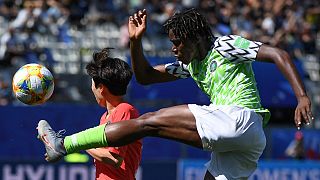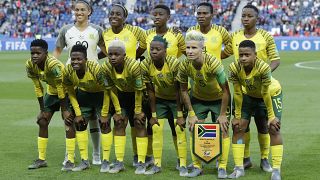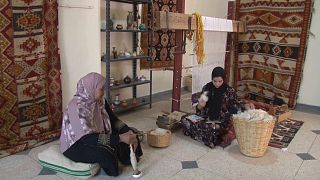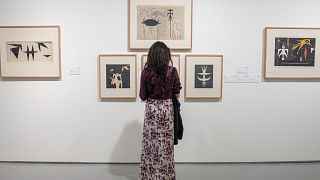Morocco
After years of being largely in the margins, Moroccan women’s football is gaining new ground at home and beyond as it captures the imaginations and hearts of young girls.
These Moroccan footballers are celebrating a big win: the Women's 2023 Morocco Championship.
And one of them will even represent the country internationally at the FIFA Women’s World Cup.
It's the first time that Morocco's national women's team has qualified for the competition.
"I cannot describe my feeling," says Ghizlane Chebbak, ASFAR club player and national team captain.
"It is more than wonderful that we are the first generation to be able to qualify for the World Cup, whether on the Moroccan or Arab level. We will represent all Arabs in this great event that anyone hopes to participate in. We feel great joy and pride. We hope to be in full our readiness."
It's starting to capture the imagination of more girls, win the hearts and minds of more parents and chip away at a traditional view by many of football as a men’s game.
"Before we were marginalised, the priority was for men's football," says Khadija Illa, president of the national women's football league.
"But thanks to the adoption of the goals' contract with the National League, and also the Royal Moroccan Federation contract with a high-class coach, Reynald Pedros, who came after being crowned the best coach in FIFA, added value to the work and the same goes for the players."
Moroccan football officials and players say their country's 2022 hosting of the Women’s Africa Cup of Nations, which drew large numbers of spectators, led to its World Cup qualification and marked a watershed moment in perceptions of women's football.
"Before, it was different because of the traditions. They used to refuse to have a girl play with a boy. Now the matter is different," says Rachida Mourachah, the FUS club women's head coach.
11-year-old Inass Belattar used to think football could only be played by boys because she had never seen girls playing on the street.
Now she plays in the Fath Union Sport league.
"When I was in the cafe watching the match, there was great joy in my heart because the Moroccan women’s team qualified for the World Cup," she says.
"I want to become like coach Rachida and also like Fatima Tagnaout also because she loves dribbling and I also love dribbling."
Belattar dreams of a career as a football player, or a coach, but also an engineer.
Bahya El Yahmidi, who oversees women’s football at ASFAR, says that with more victories, attitudes have been evolving.
"I often watch football matches with my family, whether men's or women's, especially when we see the development of women's football in Morocco and they're reaching important levels, so, of course, we will encourage them and hope that they reach a good level, and why not reach the furthest point," says supporter and fan Asmae Lebniri while at a recent ASFAR game.
Hamid Hattab never actively followed women's football, but he got hooked after seeing the achievements made by the ASFAR club at the African level:
"We qualified for the World Cup in Australia and we hope to achieve positive results and we are confident in that."
Morocco will enter the 2023 FIFA Women's World Cup, which begins 20 July, as the underdog.
Their first match is scheduled for 24 July against Germany.













01:29
Club World Cup: Inter Milan forward Luis Henrique reacts after suprise Fluminense win
01:26
FIFA Club World Cup at halfway mark amid concerns for players' health
01:02
Pogba signs 2-year deal with Monaco
01:00
Messi prepares to face former club PSG in Club World Cup
00:40
Real Madrid's Xabi Alonso backs Rudiger after alleged racist abuse
01:15
Morocco says 2024 was the hottest year with temperatures reaching 47.7 degrees